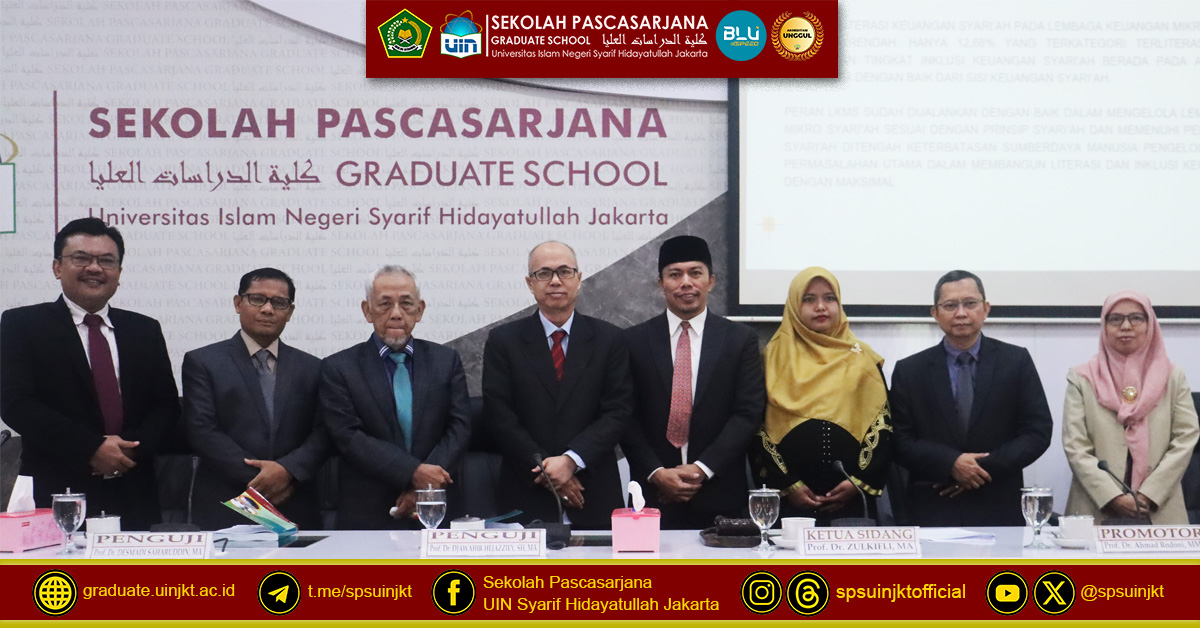Huriyatul Akmal Doctoral Promotion Exam, Sharia Financial Literacy and Inclusion at Sharia Microfinance Institutions in West Sumatra
Auditorium of Prof. Dr. Suwito, MA SPs UIN Jakarta, SPs NEWS: The Graduate School of Syarif Hidayatullah State Islamic University Jakarta held the 1632nd Doctoral Promotion Exam in the Auditorium Room of Prof. Dr. Suwito, MA SPs UIN Jakarta, on Tuesday, July 29, 2025 with promovendus Huriyatul Akmal.
Huriyatul Akmal is a student of the doctoral study program in Islamic Studies with a concentration in Islamic Economics. Huri wrote a dissertation entitled "Sharia Financial Literacy and Inclusion in Sharia Microfinance Institutions in West Sumatra"
Huri's research focuses on an in-depth analysis of the level of Islamic financial literacy and inclusion, as well as investigating the crucial relationship between the variables of Islamic Financial Literacy and the Role of MFIs (Islamic Microfinance Institutions) in Islamic Financial Inclusion. The uniqueness of this study lies in the identification of Sharia Financial Information as a mediating variable that plays an important role. Involving 205 active customer respondents from seven MFIs in West Sumatra, this study used the OJK (2023) and Sharma (2011) index models to measure literacy and inclusion levels, as well as apply Structural Equation Modelling Partial Least Square (SEM-PLS) to test the influence between variables.
One of the findings is a significant gap between the level of literacy and inclusion of Islamic finance. The results of the study show that the level of Islamic financial literacy in West Sumatra is at 12.68% and is categorized as "well literate". However, the Islamic financial inclusion rate far exceeds it, reaching 79% and is categorized as high. This large gap is in line with the results of a national survey by the OJK (2022) and research by Atika, R, et al. (2019), indicating that there is a gap that needs to be bridged between the understanding and access to Islamic financial products.
Furthermore, this study confirms that all relationships between variables have a statistically significant influence. Islamic financial literacy has been proven to have a strong influence, both directly on Islamic financial inclusion and indirectly through Islamic financial information intermediaries. Interestingly, the role of Islamic Microfinance Institutions emerged as the dominant factor with the greatest influence on Islamic financial inclusion, indicating the importance of the role of institutions in encouraging the use of financial services.
This research also emphatically highlights the central role of Islamic Financial Information as a crucial mediator. This information is not only influenced by Islamic financial literacy and the role of Islamic financial institutions, but also has a direct impact on Islamic financial inclusion. These key findings confirm a pattern of multi-pathway relationships: Islamic financial literacy and the role of institutions in influencing inclusion directly or indirectly through Islamic financial information. These two mediation channels have proven to be statistically significant, validating the effectiveness of Islamic financial information as an intermediary.
However, qualitatively, this study also identifies several obstacles that are still faced by Sharia Microfinance Institutions in efforts to strengthen literacy. Limited human resources, uneven understanding of sharia concepts and products, and lack of effective media are challenges in improving sharia financial literacy and inclusion holistically.
Huriyatul Akmal's dissertation reinforces the findings of previous research such as Grohmann, et al. (2018), Ginanjar and Kassim (2021), Muslichah, et al. (2023), Masrizal, et al. (2025), and Wahab and Mahdiya (2025) related to testing research variables. However, these findings contrast with Liu, et al. (2021) who put forward the negative impact of financial literacy on inclusion due to religious concerns, providing a unique and valuable perspective for the future development of Islamic finance.
Huriyatul Akmal successfully defended his dissertation under the guidance of Prof. Dr. Ahmad Rodoni, MM and Prof. Dr. Euis Amalia, M.Ag, and was tested in front of a board of examiners consisting of Prof. Dr. Zulkifli, MA, Prof. Dr. Ahmad Rodoni, MM, Prof. Dr. Djawahir Hejazziey, SH, MA, MH, Prof. Dr. Desmadi Saharuddin, MA and Prof. Dr. Ade Sofyan Mulazid, S.Ag, MH.
After paying attention to the dissertation writing, the comments of the examiner team and the answers of the promovendus, the examiner team determined that Huriyatul Akmal graduated with the predicate of Very Satisfactory. Huriyatul Akmal is the 1632nd Doctor in the field of Islamic Studies, in the doctoral program of the Graduate School of UIN Syarif Hidayatullah Jakarta. (JA)

